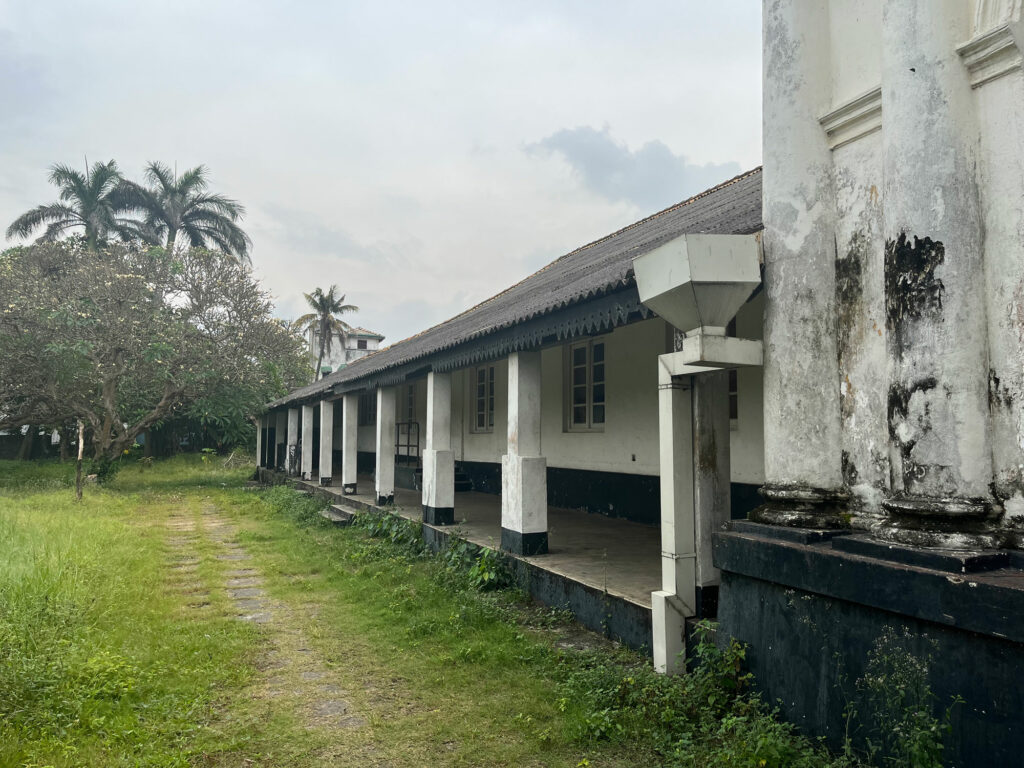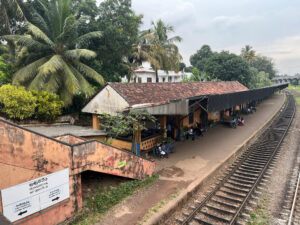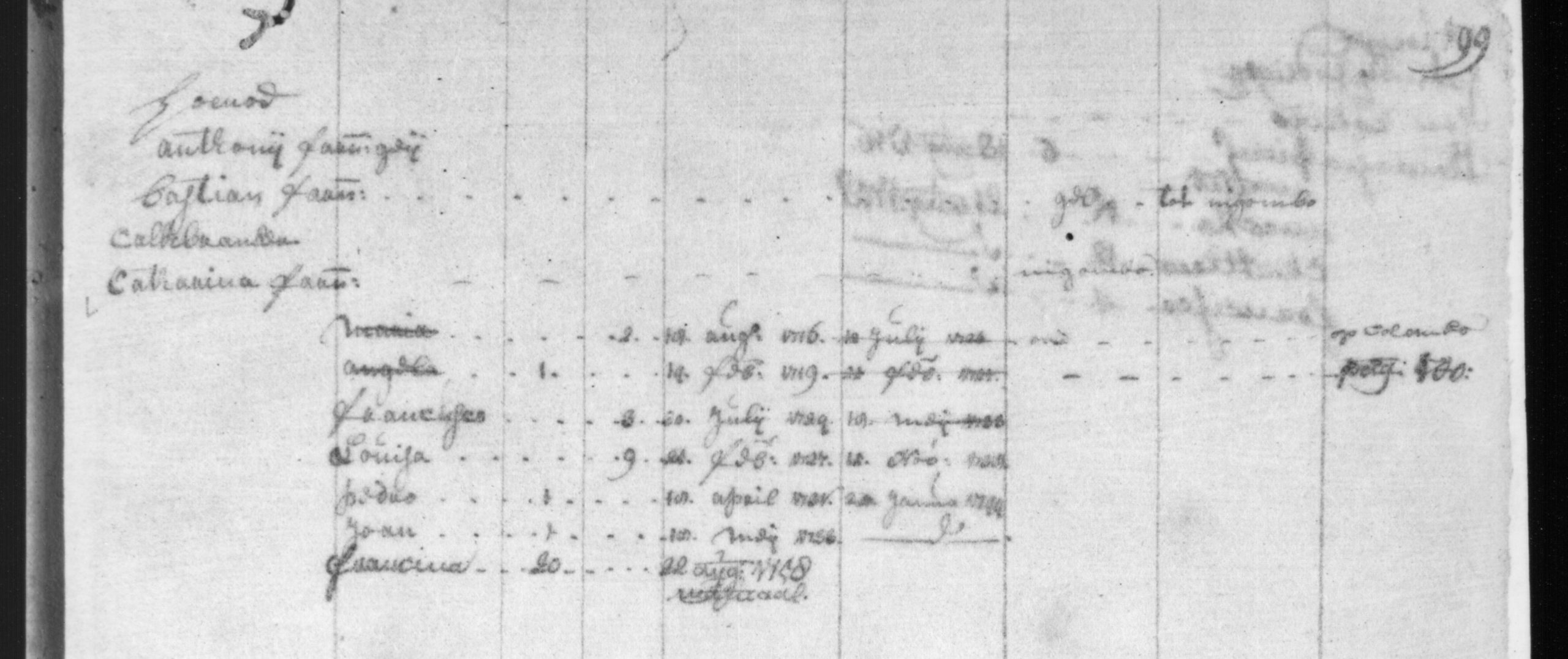Francina Farnando
Overview
Francina’s path from Wattala
Protestantism was part and parcel of Dutch colonialism. The Dutch records tell us that in the eighteenth century around one third of the Lankans living in the maritime provinces was baptized. This high number of protestants puzzles us now. The role of protestantWestern Christianity is divided into two main denominations, Catholicism and Protestantism. The latter was dominant in the Netherlands. In Sri Lanka it was specifically the Dutch Reformed Church, a protestant form of Christianity that functioned as the official church of the VOC. More baptismChristian ritual in which a person is either sprinkled with water or going under water completely in order to be officially recognised as a part of the church, and spiritually marked by God. For adults baptism often is paired with a confession of their own personal faith. When children get baptised, often before their first birthday, their parents promise to raise the child in a Christian way. More in Lankan society might have been different. For Lankans there might have been other things at stake besides conversion, such as caste, social status, property and gender. This becomes clear when we follow Francina Fernando on her way from Wattala to the Wolvendahl.
The children of Wattala
After walking for over an hour and crossing the Kelani river by ferry, Francina, twenty years old, reached the church of Mutwal with its palm-leaved roof in the nick of time. The young woman joined the queue that slowly approached the ReverendTitle for an ordained minister in the Christian church, in Dutch ‘dominee’. Here specifically related to those ministers part of the Dutch Reformed Church. These – male – spiritual leaders were the only ones allowed to baptise and consecrate marriages. More Bronsveld, a brown-skinned man in a rather odd black dress. When it was Francina’s turn, the ProtestantWestern Christianity is divided into two main denominations, Catholicism and Protestantism. The latter was dominant in the Netherlands. In Sri Lanka it was specifically the Dutch Reformed Church, a protestant form of Christianity that functioned as the official church of the VOC. More minister asked her if she knew what baptismChristian ritual in which a person is either sprinkled with water or going under water completely in order to be officially recognised as a part of the church, and spiritually marked by God. For adults baptism often is paired with a confession of their own personal faith. When children get baptised, often before their first birthday, their parents promise to raise the child in a Christian way. More meant and whether she believed in his God, because she had not been educated at the Dutch Reformed school. Since Francina’s elder siblings had told her about this, her positive answer led the ReverendTitle for an ordained minister in the Christian church, in Dutch ‘dominee’. Here specifically related to those ministers part of the Dutch Reformed Church. These – male – spiritual leaders were the only ones allowed to baptise and consecrate marriages. More to sprinkle some water on her forehead, baptising her in the ‘name of the father, the son and the holy spirit.’ A clerk wrote Francina’s name in Dutch, which she was unfamiliar with, on a long paper scroll. It was 22 August 1758, and after her baptismChristian ritual in which a person is either sprinkled with water or going under water completely in order to be officially recognised as a part of the church, and spiritually marked by God. For adults baptism often is paired with a confession of their own personal faith. When children get baptised, often before their first birthday, their parents promise to raise the child in a Christian way. More Francina returned home to Hunupitiya, across the river near modern day Wattala. Her nieces and nephew, the mostly adolescent children of her sister Angela, had been baptised there just the day before. Why would Francina want to be baptised by the Dutch church, even walking about two hours to do so?

A village divided
Angela and Francina were the eldest and youngest sisters in a family with six siblings. They were born twenty years apart, in 1718 and 1738. The Farnando family lived in the small Sinhalese community of Hunupitiya near Wattala, about seven kilometres [four miles] northeast of Colombo fort. As members of the HunuCaste-group historically associated with lime burning, but in colonial times often working as labourers in the port cities. More caste, father Bastian Farnando was obliged to provide limestone for construction and other industries in and around Colombo. Bastian and his wife Catharina both had gone to school in the Dutch Church of Negombo, where they got married. Soon thereafter, they moved to Hunupitiya and started a family. Angela and the other siblings were baptised as babies and from a young age onwards attended the Dutch Wattala school near the river. The building, which also served as a church, was of poor construction, with a leaking palm-leaf roof and shaky walls. In this Christian school, the children sat and wrote in the sand as a Sinhalese schoolmasterThese men were paid by the VOC and the church, and taught in the Christian schools, either in Sinhala, Tamil, Portuguese or Dutch. Schools often had two or more schoolmasters. Some of them were trained in the Seminary, but due to a shortage of seminarists, often they were appointed from those men who had already been the village scribes. This was useful since the schoolmasters were also responsible for keeping records of the population. More taught them reading and writing, and the basics of the Dutch Reformed religion, all in Sinhala. Francina, however, had never been able to attend school, due to village politics.
In 1731, the Salagāma and HunuCaste-group historically associated with lime burning, but in colonial times often working as labourers in the port cities. More castes in Wattala had secured certain privileges with the schoolmasterThese men were paid by the VOC and the church, and taught in the Christian schools, either in Sinhala, Tamil, Portuguese or Dutch. Schools often had two or more schoolmasters. Some of them were trained in the Seminary, but due to a shortage of seminarists, often they were appointed from those men who had already been the village scribes. This was useful since the schoolmasters were also responsible for keeping records of the population. More in agreement with the rest of the village. Their women were now, when getting married in the church, allowed to wear slippers and luxurious, flowery chintzColourful, luxurious cloth, often decorated with flowers. Made of cotton, linen and/or silk, and worn in various ways on special occasions. Southeast Asian ‘Serasah batik’ is related to this type of cloth, and the Dutch used the terms interchangeably for these and other South Asian textiles. More, and be escorted with palm-leaf parasols. These honorary permits were exceptional, generally only granted to GoyigamaHistorically the largest caste-group in the southern regions of Sri Lanka. They were known as landowners and agriculturists, often considered one of the higher castes. More women, and had proven to be problematic from the start. Whether the GoyigamaHistorically the largest caste-group in the southern regions of Sri Lanka. They were known as landowners and agriculturists, often considered one of the higher castes. More disagreed with the arrangement after all, or the schoolmasterThese men were paid by the VOC and the church, and taught in the Christian schools, either in Sinhala, Tamil, Portuguese or Dutch. Schools often had two or more schoolmasters. Some of them were trained in the Seminary, but due to a shortage of seminarists, often they were appointed from those men who had already been the village scribes. This was useful since the schoolmasters were also responsible for keeping records of the population. More denied the women their honours, is unclear. What we do know is that the wedding privileges became increasingly controversial within the village. The issue caused the HunuCaste-group historically associated with lime burning, but in colonial times often working as labourers in the port cities. More and SalagāmaCaste-group primarily associated with cinnamon peeling. During pre-colonial times they had predominantly worked as farmers only occasionally producing cinnamon for local elites like the kings. In colonial times the maintenance of the cinnamon forests and the production of consumable cinnamon became their primary task. More to either refuse, or being refused from, going to school and church. As a result, around the time Francina was born, children from the HunuCaste-group historically associated with lime burning, but in colonial times often working as labourers in the port cities. More community were absent at the Wattala school.
Christian rituals such as baptismChristian ritual in which a person is either sprinkled with water or going under water completely in order to be officially recognised as a part of the church, and spiritually marked by God. For adults baptism often is paired with a confession of their own personal faith. When children get baptised, often before their first birthday, their parents promise to raise the child in a Christian way. More were not a totally new experience for residents of eighteenth-century coastal Sri Lanka, since from the sixteenth century onwards, they had been imposed by the Portuguese and later the Dutch. Lankans had a variety of motives to be baptised, from economic to spiritual, since baptismChristian ritual in which a person is either sprinkled with water or going under water completely in order to be officially recognised as a part of the church, and spiritually marked by God. For adults baptism often is paired with a confession of their own personal faith. When children get baptised, often before their first birthday, their parents promise to raise the child in a Christian way. More provided access to the Christian schools and religious practices. Communities such as Francina’s certainly knew that without baptismChristian ritual in which a person is either sprinkled with water or going under water completely in order to be officially recognised as a part of the church, and spiritually marked by God. For adults baptism often is paired with a confession of their own personal faith. When children get baptised, often before their first birthday, their parents promise to raise the child in a Christian way. More they would not be able to have their rights to land registered. Similarly, unbaptised people could not get married under Dutch Christian law, leading them to miss out on other socio-economic opportunities. At the age of twenty, Francina would have been well aware of this too. By then, she and over 67 other youths in Wattala had not been baptised or educated at the Reformed Church school, unlike their elder siblings. This set them apart from others in their social community, which closely associated itself with the Dutch government and its religion.

Second Chance
The conflict in Wattala kept dragging on for over two decades and worried the members of the central Church Board in Colombo. Finally, when ReverendTitle for an ordained minister in the Christian church, in Dutch ‘dominee’. Here specifically related to those ministers part of the Dutch Reformed Church. These – male – spiritual leaders were the only ones allowed to baptise and consecrate marriages. More Bronsveld from Colombo visited the school on 21 August 1758, the members of the HunuCaste-group historically associated with lime burning, but in colonial times often working as labourers in the port cities. More and SalagāmaCaste-group primarily associated with cinnamon peeling. During pre-colonial times they had predominantly worked as farmers only occasionally producing cinnamon for local elites like the kings. In colonial times the maintenance of the cinnamon forests and the production of consumable cinnamon became their primary task. More communities saw their chance to bypass the GoyigamaHistorically the largest caste-group in the southern regions of Sri Lanka. They were known as landowners and agriculturists, often considered one of the higher castes. More people and the schoolmasterThese men were paid by the VOC and the church, and taught in the Christian schools, either in Sinhala, Tamil, Portuguese or Dutch. Schools often had two or more schoolmasters. Some of them were trained in the Seminary, but due to a shortage of seminarists, often they were appointed from those men who had already been the village scribes. This was useful since the schoolmasters were also responsible for keeping records of the population. More. They approached the minister independently, and that day, many children and young adults were baptised. The children over twelve, among whom were Angela’s already adolescent children, were even baptised without the religious education they normally would have been required to have. Still, Francina was not baptised in the Wattala school that day. Had she been hesitant, or had it just been getting too close to sunset by the time it was her turn to appear before the ReverendTitle for an ordained minister in the Christian church, in Dutch ‘dominee’. Here specifically related to those ministers part of the Dutch Reformed Church. These – male – spiritual leaders were the only ones allowed to baptise and consecrate marriages. More? Whatever her reasons, we know that eventually she went out of her way to make sure she would get her chance.

As soon as daylight broke on the next day, Francina rushed to the ferry and walked to Mutwal, where already a large crowd had gathered for Bronsveld’s visit to the local school. Here, at last, Francina was baptised as well. She noticed the registration of her baptismChristian ritual in which a person is either sprinkled with water or going under water completely in order to be officially recognised as a part of the church, and spiritually marked by God. For adults baptism often is paired with a confession of their own personal faith. When children get baptised, often before their first birthday, their parents promise to raise the child in a Christian way. More in the Dutch School ThombosFrom the Portuguese ‘tombo’, which translates as tome or volume, and in this case means register. The school thombo was a church register in which not only school children were registered, but also their families, as well as when each member was baptised, married and deceased. Not related to the Land and Head Thombo. More right below her older siblings’ records of years before. She was now a registered member of her baptised family, and of the Christian community of Hunupitiya. The register still exists today. It tells us not only that the reverendTitle for an ordained minister in the Christian church, in Dutch ‘dominee’. Here specifically related to those ministers part of the Dutch Reformed Church. These – male – spiritual leaders were the only ones allowed to baptise and consecrate marriages. More met her that day, but allows us to reconstruct what her life might have been like. Francina was a young woman in a small village in Sri Lanka, who one day decided that, one way or another, for one reason or another, she wanted to be baptised. Even if it took crossing a river.
School thomboFrom the Portuguese ‘tombo’, which translates as tome or volume, and in this case means register. The school thombo was a church register in which not only school children were registered, but also their families, as well as when each member was baptised, married and deceased. Not related to the Land and Head Thombo. More records: Angela (last name on the left) and her children. Sri Lanka National Archives, 1/4282, p. 100


